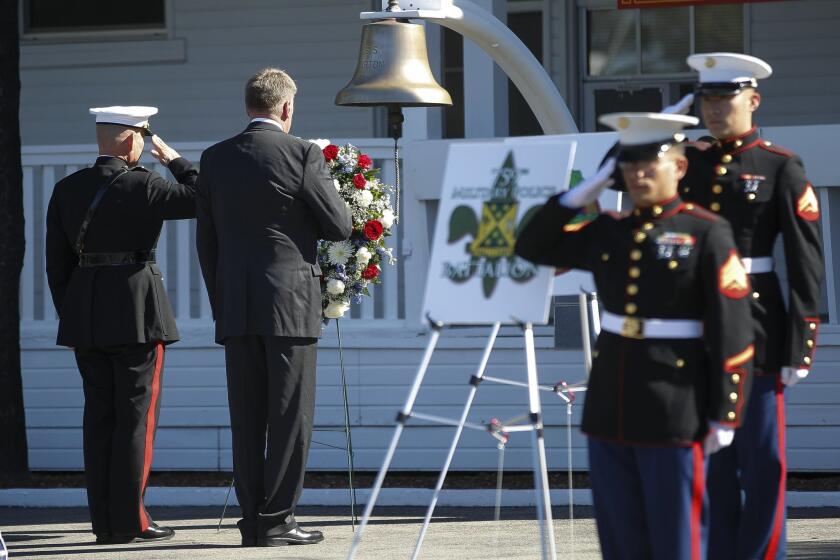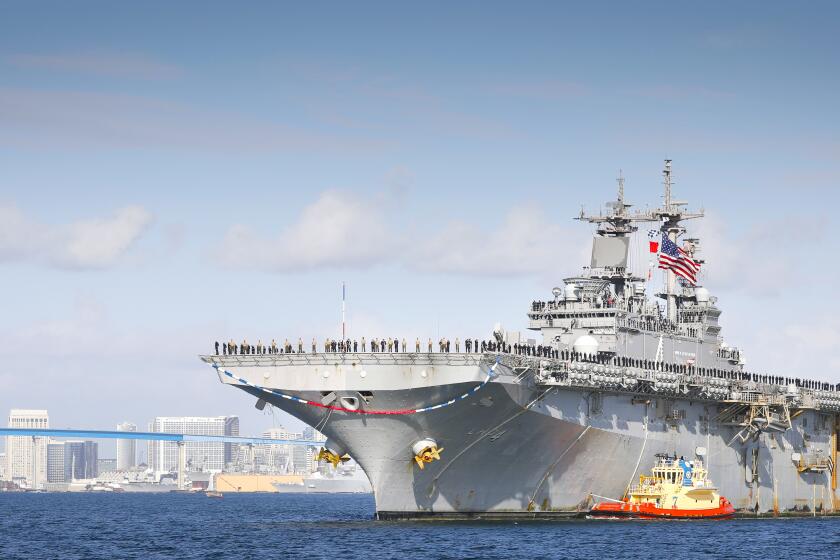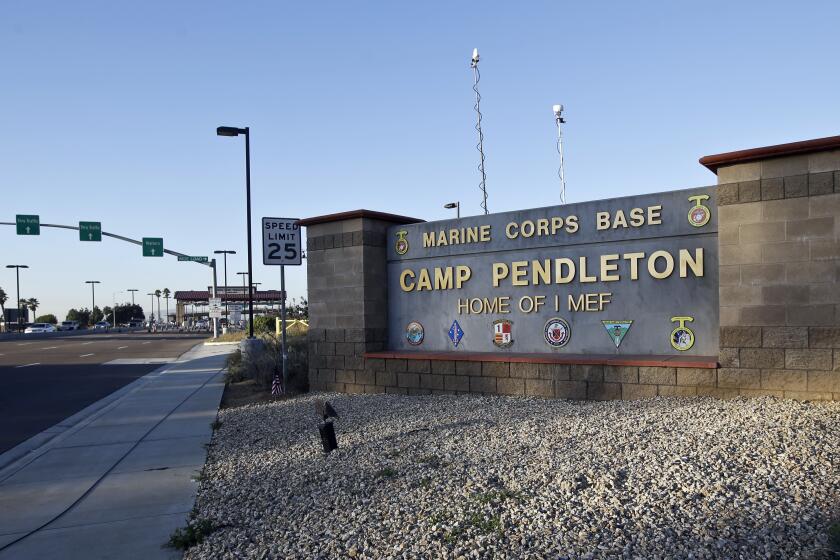After Chattanooga, a military security overhaul
As national leaders gather in Chattanooga, Tenn., this weekend for a memorial service to five military men shot to death a month ago, the armed forces are finalizing plans for tighter security at recruiting stations and other potential soft targets of terrorists and criminals.
Four Marines and a sailor were mortally wounded July 16 by a Kuwaiti-born gunman who opened fire on recruiting offices and a Navy reserve center before he was killed by police. The rampage provoked calls by some for arming military personnel in self-defense and a reminder from Defense Secretary Ash Carter that commanders already have that authority on the homefront.
Carter set a deadline of this coming Friday to receive action plans from the military services for beefing up security, measures that would augment improvements already instituted nationwide after the Chattanooga shootings.
Whether military personnel should carry arms on domestic soil remains contentious, even among service chiefs, rank-and-file service members and veterans. Some feel it would improve safety, while others fear accidental shootings and more public relations problems than warranted by the threat.
Another point of debate is whether the Chattanooga incident is the harbinger of a dangerous new era for uniformed troops serving domestically or merely the age-old threat of sporadic attacks by lone extremists.
“Personal safety, personal security has always been a main concern. Chattanooga just brings into more light the reality of that concern and what we need to do on a daily basis,” said Sgt. 1st Class Timothy Konitzer, a longtime Army recruiter in San Diego.
The Pentagon rejected early calls from lawmakers to arm all stateside personnel, citing safety, cost and compliance with varying firearms regulations. But around the country, the Chattanooga massacre quickly changed the way military recruiters and reservists operating outside of major military bases do business.
In Tennessee, some recruiters have been pulled back to armories while retail recruiting centers have been secured with fencing and bullet-resistant glass.
Navy Operational Support Centers, like the one with the Chattanooga victims, are being reinforced with a limited number of armed personnel.
The active-duty Navy has more than 1,400 recruiting stations and centers, including more than 50 in the San Diego region. “We have implemented additional random security measures at all facilities,” working closely with local officials and first responders, said Lt. Cmdr. Kris Garland, spokeswoman for Navy Recruiting Command based in Millington, Tenn. She declined to discuss specifics.
In San Diego, prospective Army recruits won’t be able to stroll into recruiting offices at will for much longer. Windows are being obscured and doors locked, so that visitors can be screened for identification and weapons.
Konitzer, 32, has worked in Army recruiting since 2008. No one has threatened him on the job, he said, but the Chattanooga attacks put everyone on edge. “It was just devastating. It’s a really sad tragedy to deal with. Safety is a major concern for the recruiters and their families. They’re operating out in the community so that is really the challenge we are going to have to face,” he said.
Pulling recruiters out of the community and onto a secure base isn’t realistic, he said. His office books 30 appointments and interacts with hundreds of people each week — at schools, beaches, the mall and other places where people 17 to 24 hang out. “I need to be able to reach out to them so if they have questions or concerns, they can actually talk to us.”
The Marine Corps, with its preponderance of young enlistees typically serving one contract term, relies heavily on recruiting to replenish its ranks.
After Chattanooga, the Marines tightened force protection for their recruiters nationwide, although they won’t say how.
As it stands, Marine recruiters are not authorized to bring personal firearms into the office. But the Corps is taking “a very hard look” at how to improve safety while maintaining the approachability that is key to recruiting, said Col. Mark Tull, chief of staff for Marine Corps Recruit Depot San Diego and the Western Recruiting Region.
“We can already be an intimidating bunch, and we cannot sustain a positive, lasting community presence if we present a threatening appearance,” Tull said.
Sgt. Erica Kirsop, 25, organizes canvassing events for Marine recruiters in San Diego at baseball games, community fairs and air shows. Her section visits more than 630 schools in three counties. “I’ve been at recruiting events where kids are afraid to talk to us just because we’re up on the pull-up bar,” Kirsop said. She wonders: How approachable would they be if they carried guns?
Military leaders have expressed mixed feelings about arming recruiters. During his Senate confirmation hearing last month to become the next commandant of the Marine Corps, Lt. Gen. Robert Neller drew criticism for saying it was “the most extreme measure” for protecting Marines and one that could alienate them from the public.
Sen. Lindsey Graham, R-S.C., scoffed that “It is time to get real as to where we stand as a nation.”
Army Chief of Staff nominee Gen. Mark Milley had testified that arming recruiters could be appropriate under certain circumstances.
Milley and the Pentagon will make the final decision, but the commanding general of Army Recruiting Command, Maj. Gen. Jeffrey Snow, is opposed to arming recruiters because of safety and the need to make centers welcoming to the public.
“There are a lot of ways we can go about protecting them without arming them,” said Kelli Bland, spokeswoman for Army Recruiting Command.
The Army is equipping recruiting centers with entry buzzers, bullet-resistant glass, and multiple exits. On the personnel side, “the key really is training,” including rehearsals for active shooters and anti-terrorism procedures, Bland said.
“We want to ensure our recruiters are being more vigilant and they are constantly paying attention to their surroundings and reporting anything suspicious,” she said.
In Chattanooga, “recruiters immediately did what they are trained to do. They took cover and made sure they were out of the line of fire as soon as they heard shots,” she said.
After the Chattanooga shootings, many bereaved and outraged Marines called for arming recruiters. A month later, the issue appeared more complicated to some.
Retired Marine Lt. Col. Jay Delarosa, 45, of San Diego, said he is on the fence. Based on his experience as a recruiter in Ventura and Los Angeles counties, guns would bring more obstacles to an already challenging duty. “Some of those schools didn’t even want military personnel on their campuses, let alone personal weapons.
“Everyone may be well-intended with saying ‘arm the recruiters,’ but that’s so shortsighted because there are second- and third-order effects of which they’ll never have to experience for themselves,” Delarosa said.
Shane Kruchten, a young Marine combat veteran and mixed-martial arts fighter from San Diego, said recruiters absolutely should be armed because local police can’t prevent every attack. “All regular service members on military installations have armed guards at the gate and roving patrols protecting them at all times so they can walk around at ease and go about their day feeling protected,” and recruiters deserve the same security, he said.
“This day and age has brought upon a new enemy. Terrorism is worldwide and comes in many different forms and speaks many different languages. There’s no longer a front line,” he said.
A young Marine pilot cautioned against knee-jerk reactions, saying said it is not the military’s job to police domestic soil against the homegrown insider threat. “What we really need is for the government to do their job so we don’t have to be armed. Arming recruiters is missing the point entirely. That being said, I could see making it easier for military (with proper training) to have more access to carry permits,” he said.
A Marine officer who works in recruiting said: “It would be a mistake to arm recruiters. It seems like a good idea...but I see a number of challenges that outweigh the benefits.
“In order to responsibly arm recruiters, the Marine Corps would have to invest a prohibitive amount of time and resources in properly training them in close quarters, urban fighting,” said the officer, who asked that his name not be used because he was speaking off-script from what the Corps had directed staff to convey.
Better options are situational awareness and protective measures, he added, such as ensuring that facilities have front and back doors, security cameras and a bulletproof barricade that blends with office decor to provide cover as troops escape from a shooter.
The father of a Marine recruiter said he was conflicted: “I know it’s a dilemma. One of the things that makes our country great is that the military arms to the teeth in combat, but is proudly not armed among the civilian population. Nevertheless, it is not right to leave them vulnerable on the street these days.”
Get Essential San Diego, weekday mornings
Get top headlines from the Union-Tribune in your inbox weekday mornings, including top news, local, sports, business, entertainment and opinion.
You may occasionally receive promotional content from the San Diego Union-Tribune.




